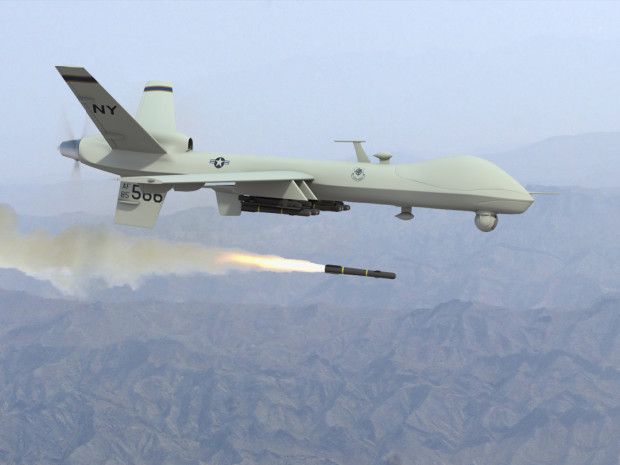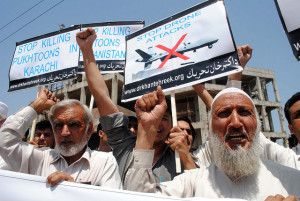by Tyler Cullis
The Bureau of Investigative Journalism reports that January was the first month without a U.S. drone strike in the Pakistani tribal areas since 2011. The Washington Post argues that this is the result of a request from Pakistan’s government after ongoing peace talks with the Taliban, though some suggest that President Obama’s new rules on targeting, released simultaneously with his National Defense University speech in May 2013, have limited the range of actors that would have earlier been targetable by the CIA and Defense Department.
It is likewise unclear whether this development will continue in the months ahead. Good reasons, however, suggest so as the war in Afghanistan draws down and the U.S. (potentially) loses access to bases in the country and to human intelligence. Below I detail some key issues we will need to pay attention to in the days ahead to see whether the White House will tilt away from the war-everywhere posture that the United States has assumed since Sept. 11.
Will the Afghan War come to a close?
It is becoming increasingly clear that President Hamid Karzai will not sign the U.S.-Afghan Bilateral Security Agreement before presidential elections in April. This poses a major dilemma for the White House, which must decide whether to make contingency plans for a small residual force should Afghan approval be forthcoming at a later date or plan a full withdrawal. But the implications run much deeper as to both the U.S.’s legal rationale for its war on al-Qaeda and the U.S.’s ability to carry out drone operations in Pakistan’s tribal areas.
If the White House is forced to commit to a total withdrawal by the end of 2014, the U.S. will lose its last remaining zone of active hostilities in its war with al-Qaeda. In this way, the legal rationale for drone strikes in Pakistan, Yemen, and Somalia will be completely untethered from any traditional war theater. This bodes ill for the continued ability of the Obama administration to wage drone warfare without incurring massive reputational damage to the United States.
Moreover, as the New York Times reported, a total withdrawal would mean the loss of basing operations in Afghanistan and thus the loss of staging grounds for CIA drone flights into Pakistan’s tribal areas. Without good options elsewhere, U.S. drone operations in the tribal areas will be seriously circumscribed, if not altogether curtailed.
How will the White House interpret its own policy guidelines?
During his May speech, President Obama outlined new targeting rules to be effective outside areas of active hostilities. These rules provide that “the United States will use lethal force only against a target that poses a continuing, imminent threat to U.S. persons.” In the absence of such a threat, the U.S. will forgo the use of lethal force (i.e., drone strikes).
However, a leading human rights lawyer, Sarah Knuckey, caught a discrepancy between the President’s policy guidelines and the justification provided by an administration official for last week’s drone strike on an al-Shabaab commander in Somalia. Instead of posing a “continuing, imminent threat to U.S. persons,” as is mandated, the U.S. official said that Ahmed Abdi Godane, the target, posed an “imminent threat to U.S. interests in the region.” Intended or not, the switch in the operative language is cause for concern, as “U.S. interests” could be stretched indefinitely to render a much wider swath of individuals targetable for drone strikes.
What is important, however, is whether the administration adopts an expansive or narrow interpretation of its own policy guidelines. With such elastic concepts as “imminence” and “U.S. interests” determining who is targetable, the White House can opt to keep the U.S. on permanent war footing long past the Iraq and Afghan Wars if it so chooses. Transparency in how the U.S. targets individuals and conducts drone strikes will be crucial to determining which of the two paths the President has chosen.
Will the U.S.’s traditional allies continue to cooperate on intelligence?
In a major policy speech at the Harvard Law School in 2011, CIA Director John O. Brennan argued that “when the [U.S.] upholds the rule of law, governments around the globe are more likely to provide us with intelligence we need to disrupt ongoing plots.” However, U.S. allies, especially in Europe, have long castigated the U.S. for its “global war on terror” and parted ways with successive White Houses over the applicable legal framework. Nonetheless, NATO allies have continued to share intelligence regarding foreign terrorist organizations, up to and including locational data for U.S. drone strikes.
Last week, however, a leading UK barrister published legal advice for a British parliamentary group concerning the legality of GCHQ surveillance, as well as intelligence cooperation with the United States. This legal advice included the striking conclusion that should a UK person share intelligence with the U.S. with the knowledge that such intelligence could be used for a drone strike, that person might be criminally liable as an “accessory to murder” under UK law. Already, a case was pressed on such grounds (though it failed for different reasons).
This was well-publicized in the British press and received much attention in U.S. legal circles. What effect it will have on intelligence cooperation is unclear, but the implications of “business as usual” have been rendered transparent. The White House can put forth dubious legal justifications for its drone operations, but that will not prevent close allies from risking criminal liability should they continue to cooperate with the U.S.






A different slant on the subject. If anything has been learned in all this war business, though it could be said that no one is paying attention, is that both the Military and the civilian suits don’t seem to get it. How else can the situation be viewed? “Let’s try this, let’s try that, let’s throw the kitchen sink in the mix, put this hack in charge, pour needed tax $$$ at home into the pockets of the people the hacks choose, and the beat goes on”. One bright spot, though some may disagree, is that it takes a corrupt group to finance another corrupt group. Between the U.S. and its allies, they have succeeded to destroy the infrastructure of each country the warmongers have bombed, while making a select group, rich beyond their dreams, again, at the U.S. taxpayers/infrastructure’s expense.
‘OBOMBER’ is making nice until he gets that “SOFA” signed with Afghanistan, then watch the Hellfire start to fly.